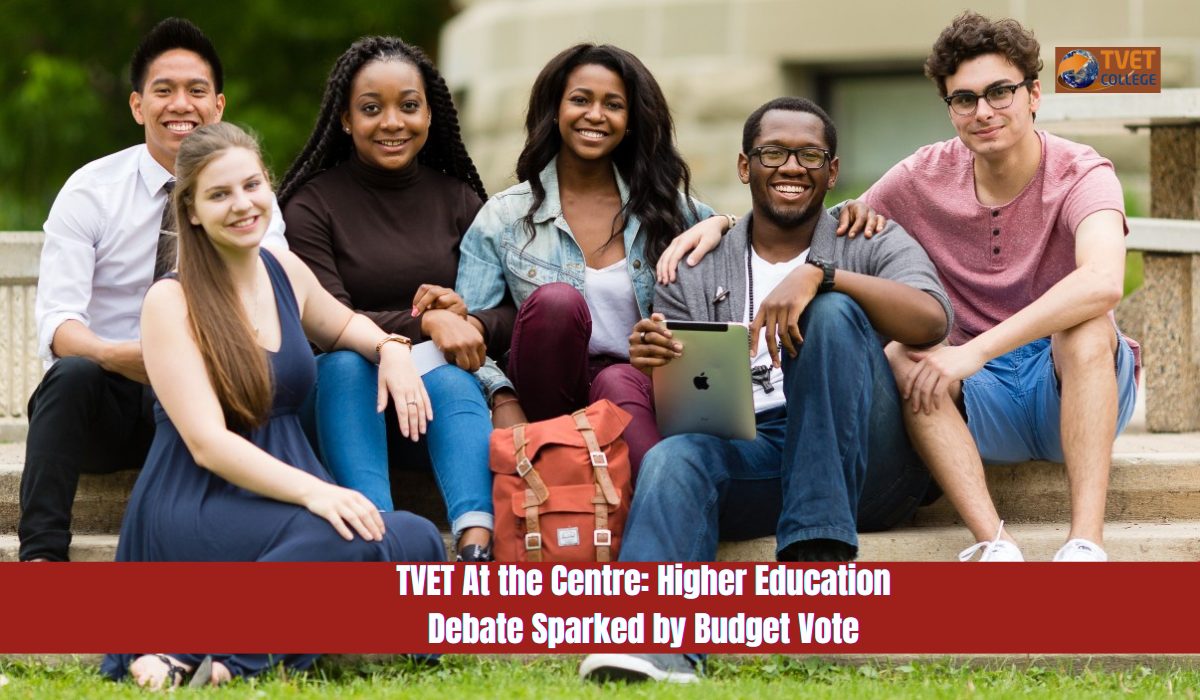TVET At the Centre: Higher Education Debate Sparked by Budget Vote

TVET At the Centre: Higher Education Debate Sparked by Budget Vote. The 2025 budget vote in South Africa’s Department of Higher Education and Training has thrust TVET colleges and broader higher education funding into the national spotlight. Minister of Higher Education and Training, Ms Nobuhle Nkabane, announced a dedicated allocation of R14 billion to TVET colleges, underscoring the government’s intention to tackle youth unemployment through technical and vocational skills development.
This allocation, up from R13.1 billion in 2024, is set to increase further to R14.7 billion next year. But while this financial commitment has been largely welcomed by the ruling party and parliamentary committee overseeing higher education, opposition parties have raised significant concerns. They question not only the management of these funds but also systemic issues within entities like NSFAS, which continue to struggle with transparency and operational efficiency.
TVET Colleges: Rebranding a National Asset
In her speech, Minister Nkabane passionately defended the critical place of TVET colleges in South Africa’s economic recovery. For decades, vocational training was viewed as a lesser alternative to university degrees. However, the minister argued that artisanal careers form the backbone of a modern economy.
“It is cool to be an artisan of the 21st century,” she declared, highlighting how the government seeks to reposition TVET colleges as institutions of choice for young people. This reflects a broader shift in global labour markets, where technical skills, hands-on expertise, and specialised certifications are increasingly prized.
Tackling Youth Unemployment: A Renewed National Focus
A staggering proportion of South Africa’s youth remain unemployed or underemployed. Recognising this, the Department of Higher Education and Training has prioritised artisan development, workplace-based learning, and sector education initiatives.
The National Skills Fund plays a pivotal role in this. According to the minister, the fund will be further leveraged to support targets outlined in the National Development Plan, notably the goal to produce 30,000 artisans by 2030.
Here’s a quick look at how artisan production has progressed in recent years:
| Period (5 Years) | Qualified Artisans Produced | Main Support Mechanisms |
|---|---|---|
| 2019 – 2024 | Over 95,000 | SETAs, workplace-based training, NSF |
This table underlines that most of these artisans are young people, benefiting directly from programmes funded by the Sector Education and Training Authorities (SETAs) and the National Skills Fund. These interventions aim not just to provide skills but to directly reduce youth unemployment.
Support and Scrutiny of the Budget Vote
The Portfolio Committee on Higher Education, chaired by Mr Tebogo Letsie, has thrown its weight behind the budget. Describing it as a “transformative instrument, a tool of justice and a pillar of nation-building,” Letsie argued that the budget embodies political commitment aligned with the historic Freedom Charter, which demands open access to education.
He stated emphatically:
“Education is the most powerful instrument to fight poverty, inequality and unemployment.”
However, the chair also warned that the committee would not tolerate discrepancies between policy goals and budget realities. Institutions receiving these funds will be held accountable to ensure resources are used efficiently, effectively, and transparently.
Opposition Parties: Rising Concerns Over Integrity, NSFAS and Systemic Flaws
While the ruling party and committee leadership championed the budget, opposition voices were starkly critical.
MK Party: Total Rejection
Mr Mnqobi Msezane of the MK Party outright rejected the budget, demanding a free, quality, decolonised education system. He cited allegations of corruption against senior department officials, questioning their ability to responsibly manage these billions.
A Budget Lacking Moral Credibility
Ms Letta Maseko (DA) stressed that budgets are moral documents, reflecting what a government truly values. She accused the department of incompetence and systemic erosion of higher education integrity, claiming the real issues go far beyond simple financial allocations.
EFF: Fix NSFAS or Scrap It
The EFF’s Sihle Lonzi took aim at NSFAS, calling it a broken system fraught with inefficiency. He criticised its cumbersome middlemen structures and warned:
“Fix NSFAS or eradicate it entirely.”
He also lambasted the department’s contradictory spending priorities, asking why billions go to bail out failing state enterprises like Eskom, yet graduates struggle to receive their certificates due to bureaucratic delays.
IFP: Accountability Deficit
Mr Sanele Zondo of the IFP raised transparency concerns, particularly around how boards of SETAs are appointed, echoing longstanding dissatisfaction with the ministry’s accountability.
PA: Protecting Academic Autonomy Without Evading Oversight
PA’s Mr Ashley Sauls supported parliamentary scrutiny, noting:
“We will continue to hold you accountable without fear or favour.”
He argued that universities and colleges shouldn’t hide behind academic autonomy to avoid being transparent about hiring practices and budget use.
ActionSA & ACDP: Deep Structural Worries
ActionSA’s Malebo Kobe described the ministry as “a chaos embedded institution,” calling for a complete overhaul of NSFAS leadership to restore trust. Similarly, Mr Wayne Thring of the ACDP argued that the seemingly modest 4.8% budget increase masks entrenched structural weaknesses, especially the stigma that still burdens TVET colleges despite their clear potential for driving economic inclusion.
Why This Debate Matters for South Africa’s Future
At its heart, this heated debate isn’t just about annual budget numbers. It’s about shaping a skills-driven economy, tackling youth unemployment, and ensuring that institutions like TVET colleges and mechanisms like NSFAS function as intended.
Without transparent governance, strategic artisan training and skills initiatives could be undermined by administrative failures or corruption, squandering opportunities for thousands of young South Africans.
FAQs About South Africa’s Higher Education Budget and TVET Strategy
Why are TVET colleges so crucial to South Africa’s economy?
Ans: TVET colleges provide practical, technical, and vocational skills that align with market needs. They produce artisans, technicians, and other skilled professionals who are essential for infrastructure development, manufacturing, and service industries sectors critical to job creation.
What is NSFAS, and why is it controversial?
Ans: NSFAS (National Student Financial Aid Scheme) funds tuition and living costs for qualifying students. However, it faces criticism over mismanagement, opaque processes, and delays that hamper student success and trust in the system.
How is the government trying to reduce youth unemployment through this budget?
Ans: By allocating significant resources to TVET colleges, artisan development programmes, and the National Skills Fund, the government hopes to upskill young people, making them more employable and entrepreneurial, directly reducing youth unemployment.
Conclusion
This year’s budget debate highlights a profound crossroads for South Africa. On the one hand, the R14 billion boost to TVET colleges and the broader commitment to artisan development could be game-changers for tackling youth unemployment and building a competitive economy. On the other, glaring concerns around NSFAS, leadership integrity, and systemic inefficiencies threaten to derail these ambitions.












